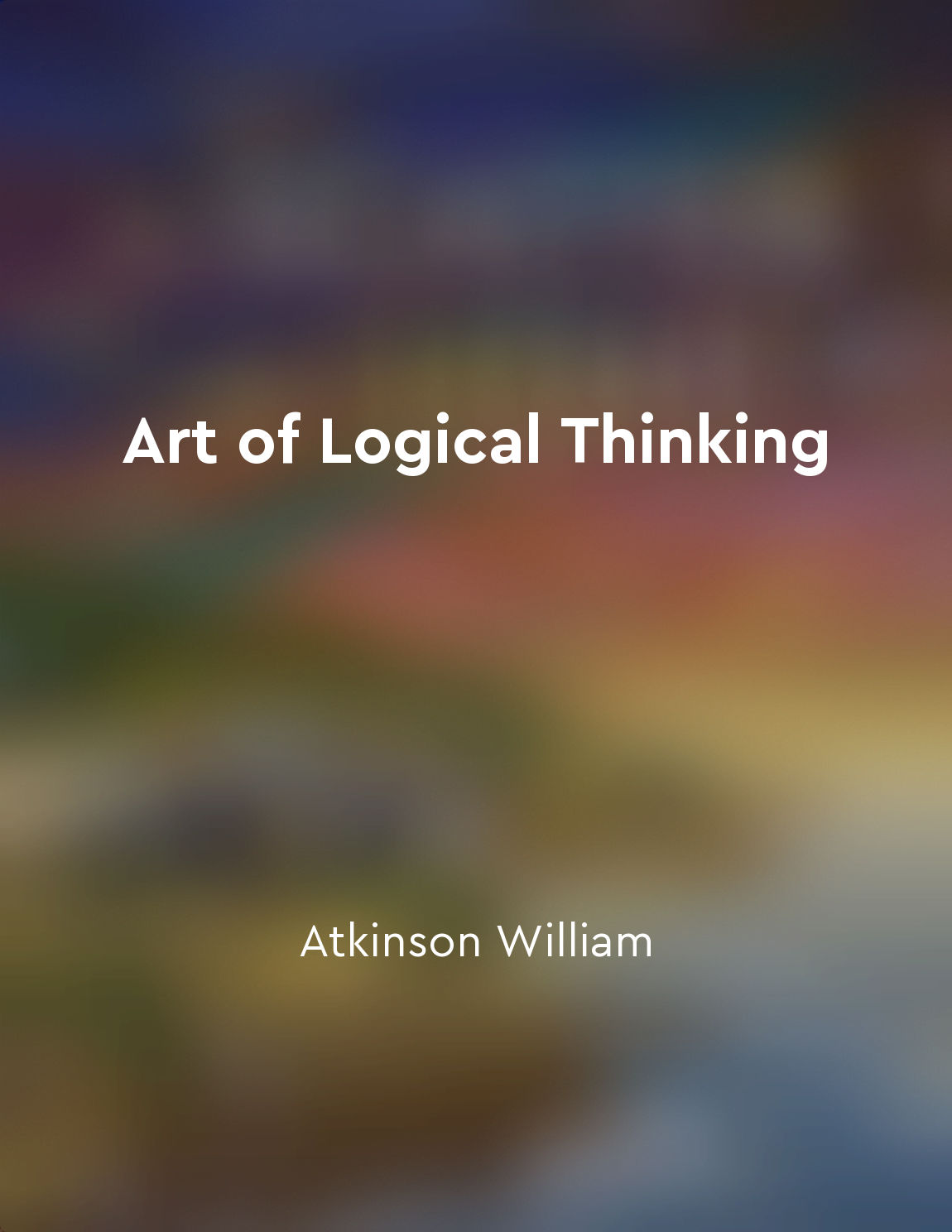Audio available in app
The premise supports the conclusion from "summary" of Art of Logical Thinking by Atkinson William
The foundation upon which a conclusion rests is known as the premise. In logical thinking, the premise acts as the building block for the conclusion, providing the necessary support and justification for the final claim. Without a strong and relevant premise, the conclusion lacks credibility and validity. The relationship between the premise and the conclusion is crucial in determining the strength of an argument. When evaluating an argument, it is essential to examine whether the premise effectively supports the conclusion. A premise that is vague, irrelevant, or unsupported will not provide a solid foundation for the conclusion. On the other hand, a well-constructed premise that is logically connected to the conclusion enhances the persuasiveness of the argument. In order to establish a strong connection between the premise and the conclusion, it is important to ensure that the premise is relevant to the topic at hand. The premise should directly address the issue being discussed and provide relevant information or evidence to support the conclusion. Additionally, the premise should be clear and specific, avoiding ambiguity or confusion that could weaken the argument. Furthermore, the premise should be logically connected to the conclusion, with a clear and coherent line of reasoning between the two. The premise should lead logically to the conclusion, with each step in the argument building upon the previous one. This logical sequencing helps to create a coherent and persuasive argument that is easy to follow and understand. In addition to logical sequencing, transition words and phrases can also help to connect the premise to the conclusion. By using words like "therefore," "thus," or "because," the author can signal the relationship between the premise and the conclusion, making it clear how the two are connected. These transition words help to guide the reader through the argument, highlighting the logical progression from the premise to the conclusion. Consistency in tone and style is also important when connecting the premise to the conclusion. By maintaining a consistent voice and writing style throughout the argument, the author can create a sense of coherence and unity that strengthens the connection between the premise and the conclusion. This consistency helps to build trust with the reader and enhances the overall effectiveness of the argument. Grammar and syntax play a crucial role in ensuring that the premise effectively supports the conclusion. Clear and concise language, free of grammatical errors, helps to convey the author's ideas in a coherent and persuasive manner. By using proper grammar and syntax, the author can communicate the relationship between the premise and the conclusion with clarity and precision.Similar Posts
Engage in selfreflection to enhance self-awareness
Self-reflection is a powerful tool for gaining a deeper understanding of ourselves. By taking the time to reflect on our though...

Understanding fallacies can improve reasoning skills
Understanding fallacies is crucial in the development of better reasoning skills. By being able to identify common fallacies su...
Practicing with sample questions
It is crucial to practice with sample questions when preparing for the TOEFL exam. By doing so, you can familiarize yourself wi...
Foster a supportive writing community in the classroom
To create a classroom environment that nurtures writing growth, it is important to establish a sense of community among student...

Fostering positive relationships through communication
Fostering positive relationships through communication is a fundamental aspect of effective communication skills. It involves b...
Practice makes perfect in public speaking
Public speaking is a skill that can be developed and improved over time through consistent practice. The more you speak in fron...
Read widely and deeply
To truly expand your mind and broaden your understanding of the world, it is imperative to immerse yourself in a wide array of ...
It fosters intellectual curiosity
The concept of fostering intellectual curiosity is essential in developing critical thinking skills. When individuals are curio...
Use persuasive language to make your argument more compelling
To win an argument, you must use persuasive language that captures the attention of your audience and convinces them of your po...
Framing arguments effectively is necessary
To persuade and influence others successfully, it is crucial to frame arguments effectively. This means presenting your ideas i...


